Browse the Collection
Browsing 47 items in our archive
Filters: Thomas, June Manning, Demographic surveys, Questionnaires, College trustees, Music Clear filters
-
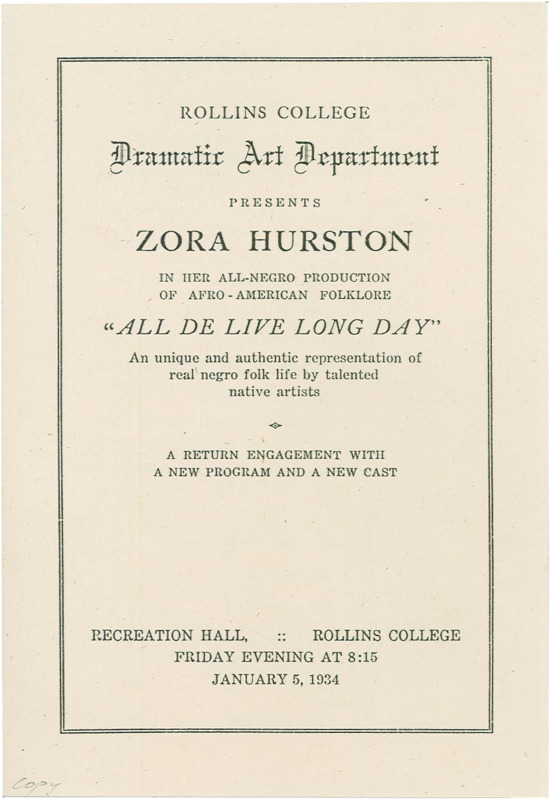 Rollins College | Text
Rollins College | TextAll De Live Long Day Program, 1934
All De Live Long Day, a program of African American folklore, music, and dance, was the second of two productions by Zora Neale Hurston to be performed on the Rollins campus during the 1930s.Learn more -
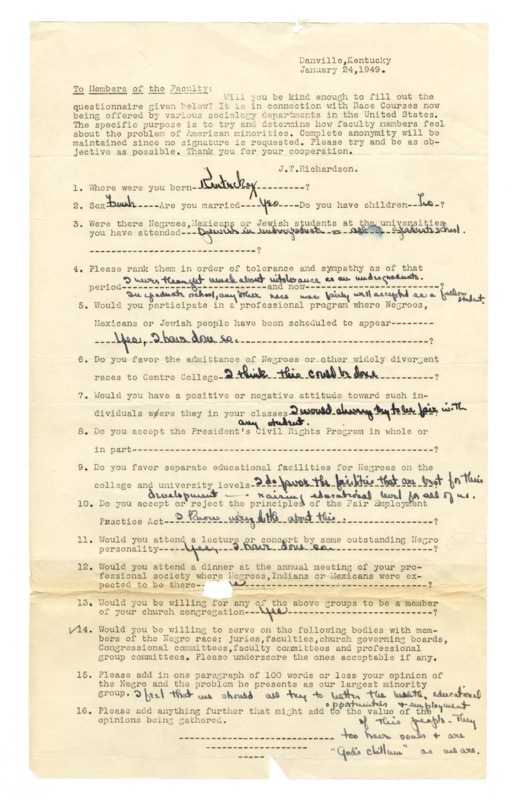 Centre College | Text
Centre College | TextAmerican minorities faculty questionnaire (1)
Anonymous responses to a questionnaire distributed to Centre College faculty January 24, 1949, the stated purpose of which was "to try an determine how faculty members feel about the problem of American minorities."Learn more -
 Centre College | Text
Centre College | TextAmerican minorities faculty questionnaire (10)
Anonymous responses to a questionnaire distributed to Centre College faculty January 24, 1949, the stated purpose of which was "to try an determine how faculty members feel about the problem of American minorities."Learn more -
 Centre College | Text
Centre College | TextAmerican minorities faculty questionnaire (11)
Anonymous responses to a questionnaire distributed to Centre College faculty January 24, 1949, the stated purpose of which was "to try an determine how faculty members feel about the problem of American minorities."Learn more -
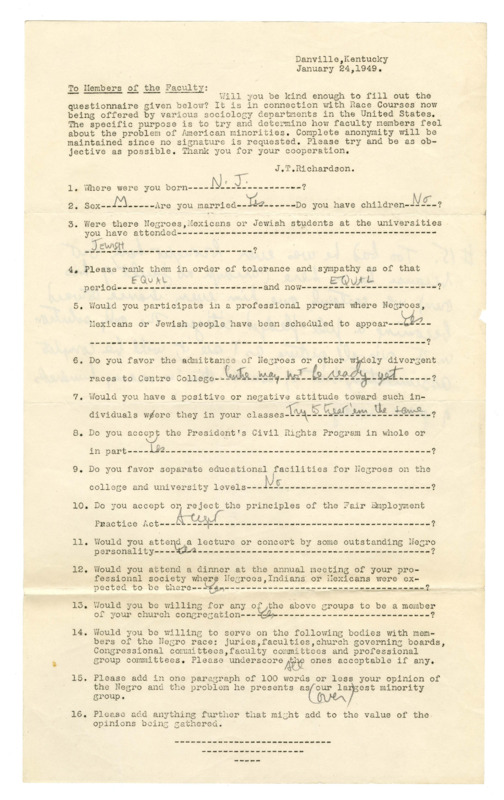 Centre College | Text
Centre College | TextAmerican minorities faculty questionnaire (12)
Anonymous responses to a questionnaire distributed to Centre College faculty January 24, 1949, the stated purpose of which was "to try an determine how faculty members feel about the problem of American minorities."Learn more -
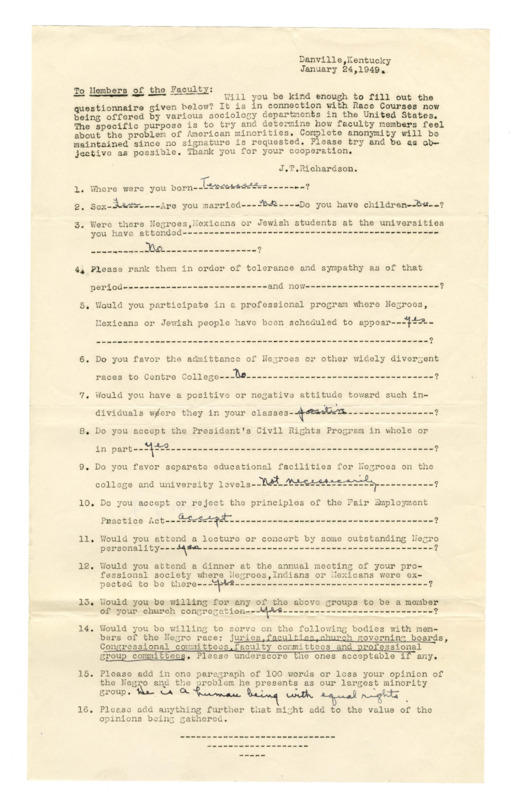 Centre College | Text
Centre College | TextAmerican minorities faculty questionnaire (2)
Anonymous responses to a questionnaire distributed to Centre College faculty January 24, 1949, the stated purpose of which was "to try an determine how faculty members feel about the problem of American minorities."Learn more -
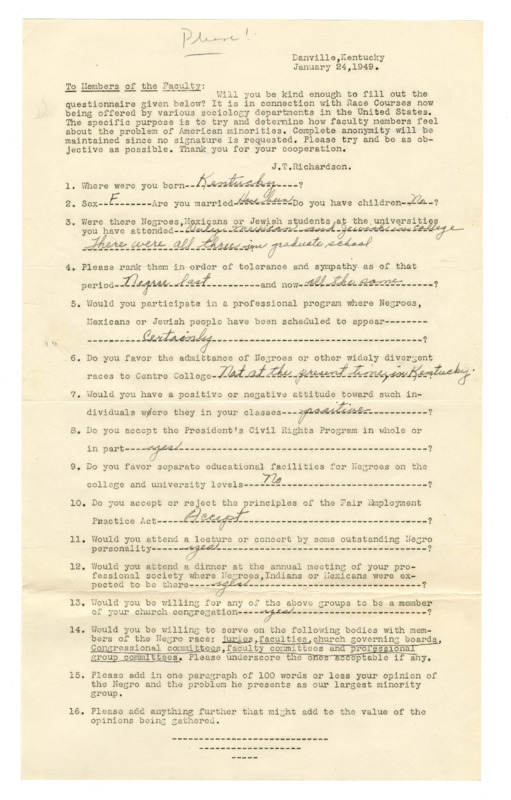 Centre College | Text
Centre College | TextAmerican minorities faculty questionnaire (3)
Anonymous responses to a questionnaire distributed to Centre College faculty January 24, 1949, the stated purpose of which was "to try an determine how faculty members feel about the problem of American minorities."Learn more -
 Centre College | Text
Centre College | TextAmerican minorities faculty questionnaire (4)
Anonymous responses to a questionnaire distributed to Centre College faculty January 24, 1949, the stated purpose of which was "to try an determine how faculty members feel about the problem of American minorities."Learn more -
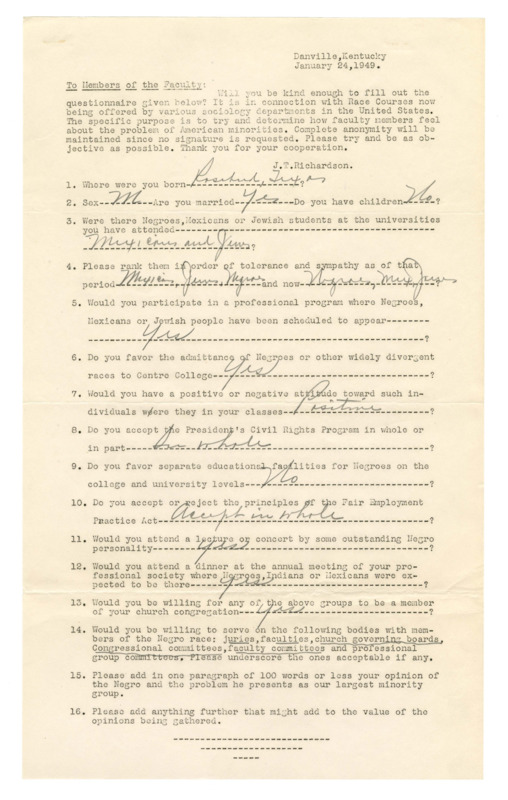 Centre College | Text
Centre College | TextAmerican minorities faculty questionnaire (5)
Anonymous responses to a questionnaire distributed to Centre College faculty January 24, 1949, the stated purpose of which was "to try an determine how faculty members feel about the problem of American minorities."Learn more -
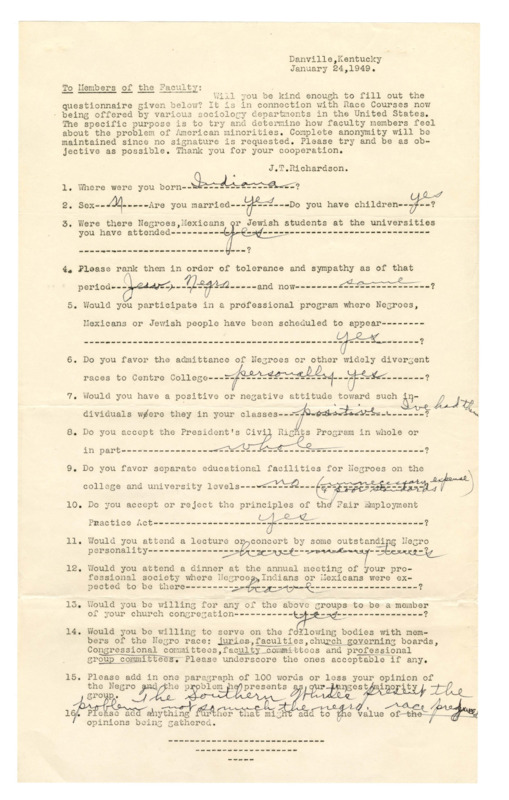 Centre College | Text
Centre College | TextAmerican minorities faculty questionnaire (6)
Anonymous responses to a questionnaire distributed to Centre College faculty January 24, 1949, the stated purpose of which was "to try an determine how faculty members feel about the problem of American minorities."Learn more -
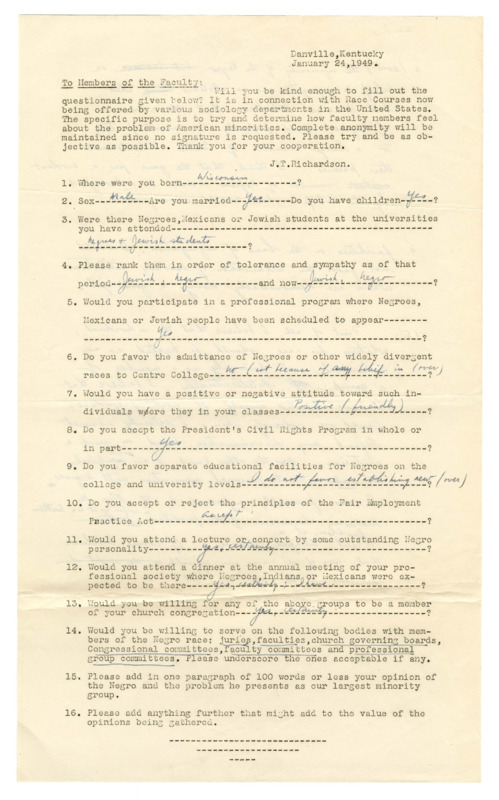 Centre College | Text
Centre College | TextAmerican minorities faculty questionnaire (7)
Anonymous responses to a questionnaire distributed to Centre College faculty January 24, 1949, the stated purpose of which was "to try an determine how faculty members feel about the problem of American minorities."Learn more -
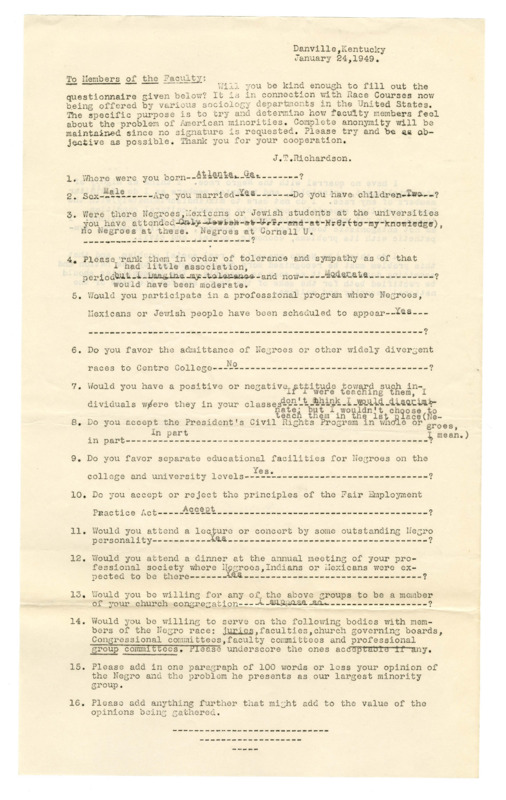 Centre College | Text
Centre College | TextAmerican minorities faculty questionnaire (8)
Anonymous responses to a questionnaire distributed to Centre College faculty January 24, 1949, the stated purpose of which was "to try an determine how faculty members feel about the problem of American minorities."Learn more -
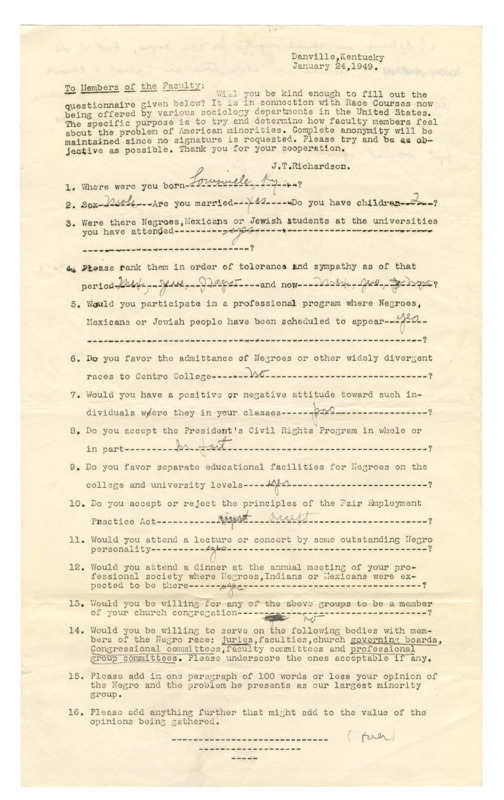 Centre College | Text
Centre College | TextAmerican minorities faculty questionnaire (9)
Anonymous responses to a questionnaire distributed to Centre College faculty January 24, 1949, the stated purpose of which was "to try an determine how faculty members feel about the problem of American minorities."Learn more -
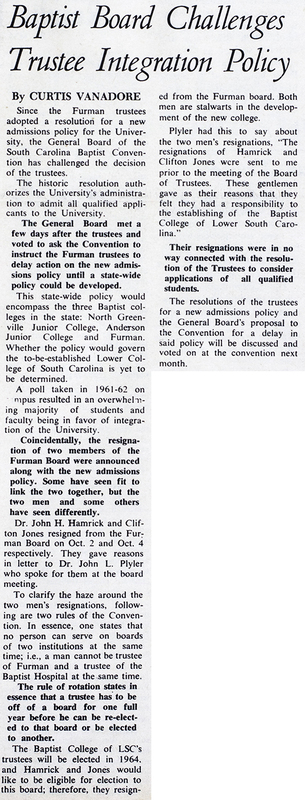 Furman University | Text
Furman University | TextBaptist Board Challenges Trustee Integration Policy
An article appearing in Furman's student newspaper, The Paladin, dated October 26, 1963, detailing a challenge, made by the General Board of the South Carolina Baptist Convention, to the Furman trustee's resolution authorizing Furman to admit all qualified applicants regardless of race.Learn more -
 Furman University | Text
Furman University | TextBoard To Recommend 'Hands-Off' Policy to Baptist Convention
An article appearing in Furman's student newspaper, The Paladin, dated October 23, 1964. The author writes about the General Board of the South Carolina Baptist Convention's recommendation that the convention abopt a hands-off policy towards desegregation. Admission policies would be left to the trustees of it's church supported colleges.Learn more -
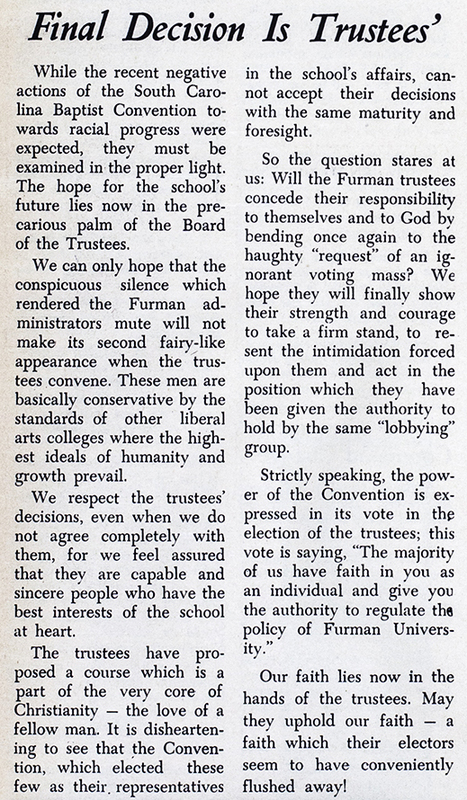 Furman University | Text
Furman University | TextFinal Decision Is Trustees'
An editorial appearing in Furman's student newspaper, The Paladin, dated November 16, 1963. The author is calling for the Furman Board of Trustees to be strong and not bend to the will of the South Carolina Baptist Convention.Learn more -
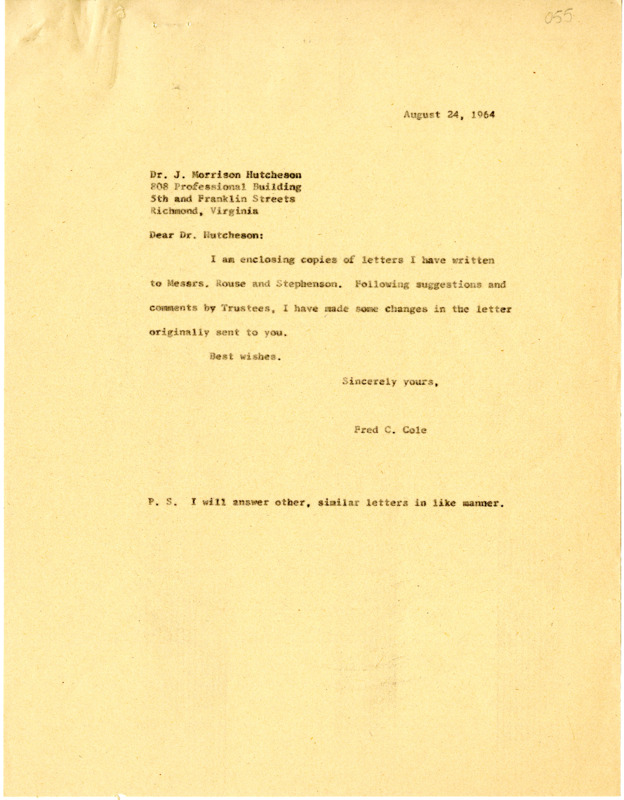 W & L University | Text
W & L University | TextForwarded Correspondence from Fred C. Cole to J. Morrison Hutcheson (August 1964)
This correspondence documents President Fred C. Cole asking members of the Board of Trustees to approve a reply to a letter.Learn more -
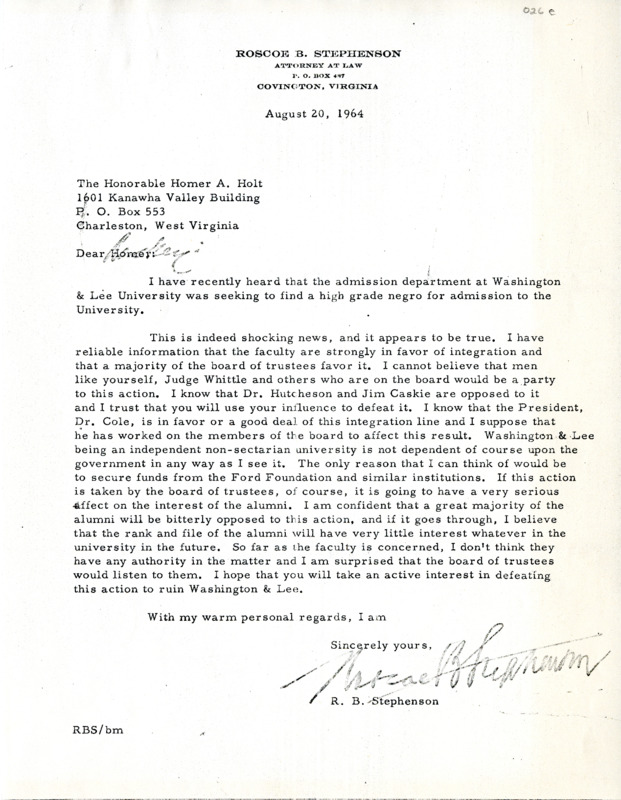 W & L University | Text
W & L University | TextForwarded Correspondence from Homer A. Holt to Fred C. Cole
Trustee Homer A. Holt forwarded correspondence from Hutcheson and Morrison on the topic of integration to President Fred C. Cole.Learn more -
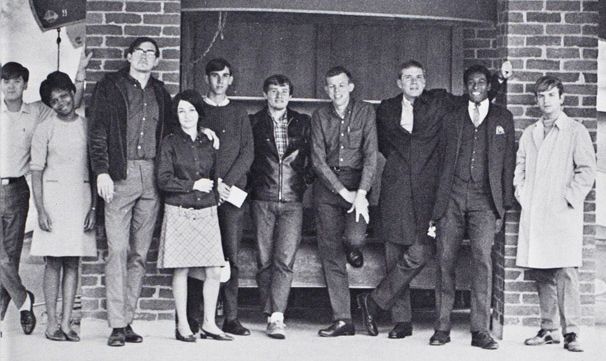 Furman University | Image
Furman University | ImageFurman Chapter of the Southern Student Organizing Committee
Photograph of the Furman Chapter of the Southern Student Organizing Committee, an organization of students committed to peace, racial equity, and participatory democracy. From the 1968 Furman yearbook: 'SSOC is convinced that society is in need of radical reform on every level, including the university level. It is our purpose to work for these reforms, both through education and direct action. Ready to organize are the members of the Southern Student Organizing Committee.Learn more -
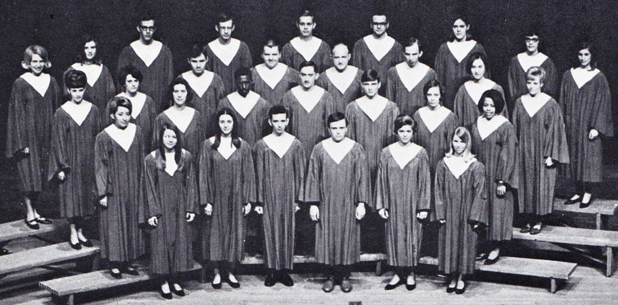 Furman University | Image
Furman University | ImageFurman Concert Choir
Joseph Vaughn '68 performing in the Furman Concert Choir. Vaughn became the university's first African American student on Jan. 29, 1965.Learn more -
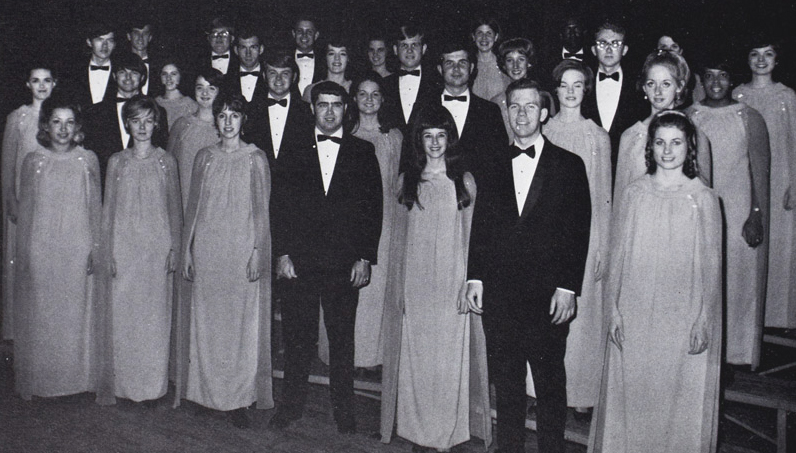 Furman University | Image
Furman University | ImageFurman Concert Choir
The 1969-1970 Furman University Concert Choir. A member of the choir, Sarah Reese '71, can be seen at the far right in photo, third row. Reese enrolled at Furman in 1967 as one of the university's first African American women. Sarah Reese would later become a world-famous opera singer.Learn more -
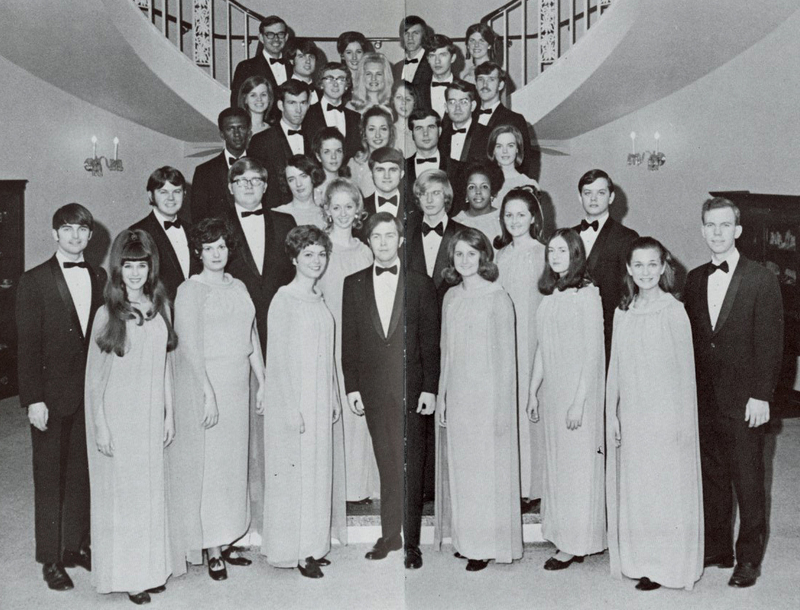 Furman University | Image
Furman University | ImageFurman Concert Choir
The 1970-1971 Furman University Concert Choir. Members of the choir include: Sarah Reese '71, in the third row, far right, and Ronald (Rawn) Harbor '71, in the fourth row, far left. Reese and Harbor were some of Furman's first African American students.Learn more -
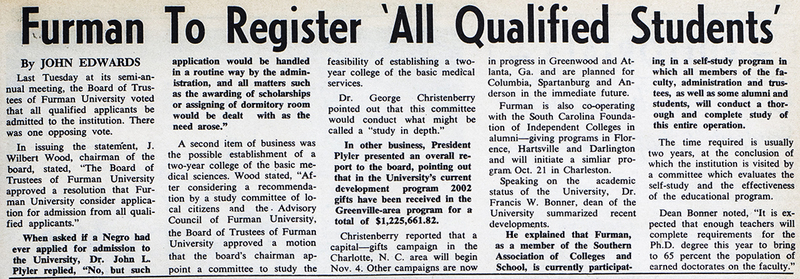 Furman University | Text
Furman University | TextFurman to Register 'All Qualified Students'
An article appearing in Furman's student newspaper, The Paladin, dated October 12, 1963, detailing a Furman Board of Trustees meeting, held October 8th, 1963, where the Board approved a resolution that Furman University consider applications for admission from all qualified applicants. The author also writes about other topics discussed in the meeting.Learn more -
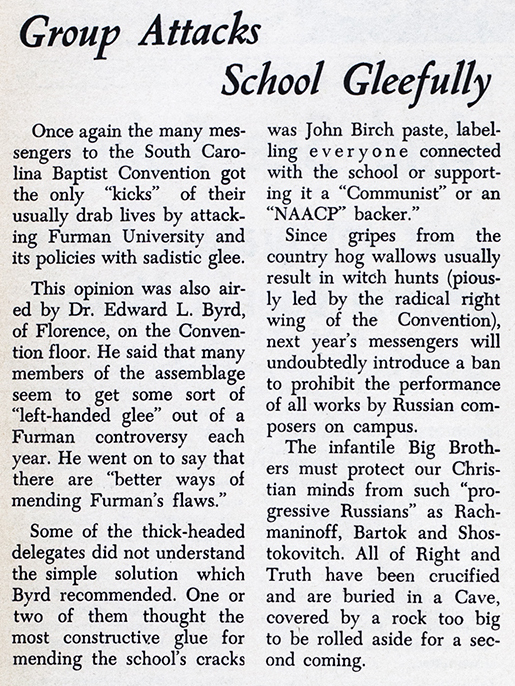 Furman University | Text
Furman University | TextGroup Attacks School Gleefully
An editorial appearing in Furman's student newspaper, The Paladin, dated November 16, 1963. The author is very critical of the South Carolina Baptist Convention and it's reaction to the Furman trustee's resolution authorizing Furman to admit all qualified applicants regardless of race or color.Learn more -
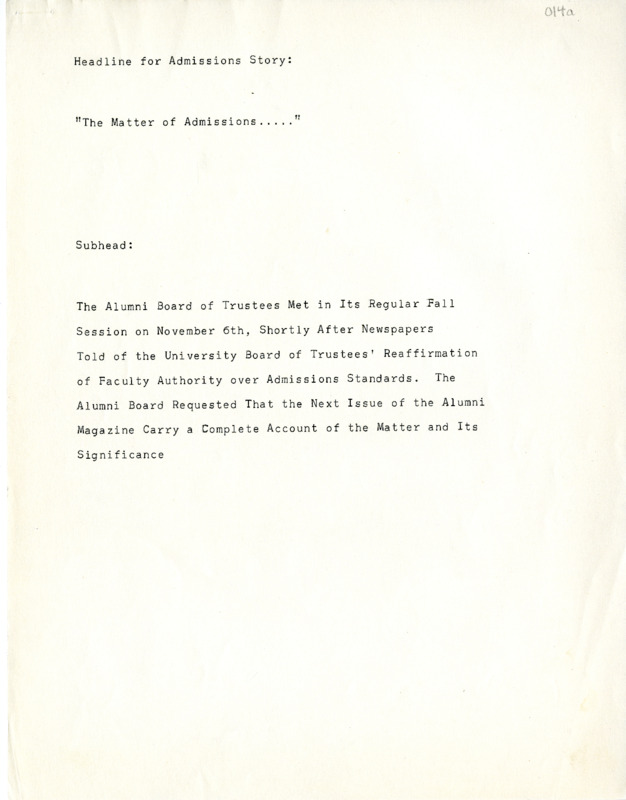 W & L University | Text
W & L University | TextHeadline for Admissions Story: "The Matter of Admissions....."
This draft of an article for the Alumni Magazine explains the Board of Trustees' movement towards integration. This draft differs from (and is more revealing than) the version published in the Fall 1964 edition of the Alumni Magazine.Learn more
